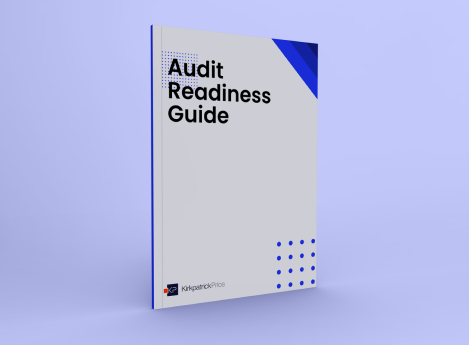
What is an Audit Scope?
What is an Audit Scope and How Does it Impact an Audit?
Knowing where your assets reside and which controls apply to them are critical for any organization. Why? This is the only way you can manage and secure them from a potential data breach or security incident.
During the initial phases of a SOC 1 or SOC 2 audit, an auditor will walk you through defining the scope of your audit. What does that entail? Below, we define an audit scope, explore scope requirements, and help you determine the right scope for your business audit needs.
What Is an Audit Scope?
Defining an audit scope sets boundaries for the assessment by requiring organizations to outline anything that could otherwise impact the security of the protected information. Understanding the scope is crucial for both the auditors and the entity being audited, as it sets clear expectations and focuses the audit efforts.
Key Audit Scope Components
By clearly defining the audit scope, auditors and stakeholders can ensure the audit is focused, efficient, and aligned with the organization’s objectives. Below are some key components to include in your audit scope.
- Extent of Examination: Specifies which departments or functions of the organization or which processes will be included in the audit.
- Time Period: Identifies the specific duration or financial year(s) the audit will cover, such as a fiscal period.
- Depth of Audit: Determines how thoroughly each area will be examined and if the audit will be a high-level overview or a detailed examination.
- Objectives and Goals: Outlines what the audit aims to achieve, such as compliance verification, financial accuracy, or process effectiveness. It also anticipates potential recommendations, improvements, or corrective actions that may follow the audit.
- Regulatory Framework: Includes any specific laws, standards, policies and procedures, or regulations that the audit is designed to assess compliance with.
- Resource Allocation: Details the resources (like manpower, technology, documentation, and data) that will be dedicated to the audit.
- Reporting: Defines what content is included in the audit results, how the findings are reported and formatted, and to whom they are delivered to.
How Do You Define the Scope of a SOC 1 or SOC 2 Audit?
When an organization partners with their auditor to define the scope of their SOC 1 or SOC 2 audit, they’ll typically answer questions, such as:
- Which locations are involved?
- Do you have any third parties? What services do they provide?
- How many business applications and technology platforms are involved?
- Which systems are involved?
- What people are responsible?
- Which processes focus on internal control over financial reporting?
How Can a Well-Defined Audit Scope Help Identify Potential Risks and Issues?
A well-defined audit scope identifies potential risks and issues within an organization. Targeted risk assessment focuses on specific areas where risks are most likely to be present. It also ensures the audit is not only efficient but also effective in pinpointing where attention is needed most.
Additionally, a clear audit scope allows for optimal resource allocation, directing efforts and resources to the areas that are of high risk, thereby maximizing the effectiveness of the audit process.
Clarity is another significant benefit, ensuring the audit’s alignment with the most relevant risk areas and critical issues are not overlooked. This alignment is essential for the audit to be truly effective in assessing and mitigating risks.
When mitigating risks, early detection of issues is critical. A focused audit scope helps identify problems at an early stage, allowing your business to take corrective actions in a timely manner. This proactive approach can prevent minor issues from escalating into major problems, saving the organization time and resources in the long run.
Lastly, a well-defined scope offers comprehensive coverage, ensuring the examination of all critical organizational areas without wasting resources on unnecessary or redundant areas. This thorough approach guarantees a complete and successful audit, covering everything and leaving no risk unnoticed.
Can Your Audit Scope be Too Broad or Too Narrow?
The scope of an audit can greatly impact the overall effectiveness. If the scope is too broad, an auditor could miss critical items during the assessment. If the scope is too narrow, an auditor might be unable to perform an accurate assessment or give an accurate opinion of an organization’s controls because some may have been left out.
This is why partnering with an expert, senior-level Information Security Specialist, like those at KirkpatrickPrice, is so critical. If you want to get the most out of your investment in a SOC 1 or SOC 2 audit, effective scoping is key.
Can the Scope of an Audit Vary for Different Organizations or Industries?
Yes, the scope varies significantly and depends on several elements, including:
- Industry-Specific Requirements: Different industries have unique regulatory and compliance requirements influencing the audit scope.
- Organizational Size and Complexity: Larger or more complex organizations may require a broader and more detailed audit scope.
- Nature of Business Activities: Companies engaged in different activities (e.g., manufacturing vs. service) have distinct focus areas.
- Risk Profile: Organizations with different risk exposures (financial, operational, technological) will have tailored audit scopes.
- Previous Audit Findings: Past audit outcomes can influence the focus of future audits.
One of the very first things that you will do as part of your audit is work with your auditor on the definition of scope. You’ll go through a scoping process with us where we identify the policies and procedures, the people, and the locations. For example, is there application development that’s in scope? Where are those developers located? Where do they do their work? What cloud applications are involved in this? What part of that is or isn’t in scope? What IT resources are in scope? Are there parts of the network that should be included or excluded from the audit? We’ll go through that and define it because it is a very important step, and we have to know what the boundaries of the system are so that we can collect evidence from the appropriate people, processes, and technologies. Contact us today and enjoy working with one of our expert Information Security Specialists who will guide you through the scoping process.
